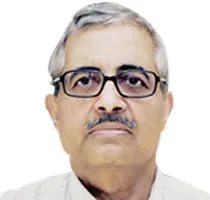-
CENTRES
Progammes & Centres
Location

A long-frozen conflict over the Nagorno-Karabakh enclave erupted between Azerbaijan and Armenia on Sunday triggering fears the clashes could grow into an all-out war that could drag regional powers -Turkey, Russia - into it. Both Azerbaijan and Armenia have declared martial law and mass mobilisations.
Armenia maintains it was Azerbaijan that started hostilities with a 7 a.m. missile attack along the Line of Contact that included the targeting of the capital of Nagorno-Karabakh, Stepanakert, according to IntelliNews, a news portal from the region.
Other sources report that Azerbaijan claims that over 550 Armenians have been killed or wounded in the clashes, and large quantitates of military equipment destroyed. Similarly, the Armenians claim that Azeris have lost 200 lives and significant military equipment, including tanks, armoured carriers, helicopters, and drones. There are unverified videos circulating on the internet of both sides losing military equipment to artillery fire and landmines.
Nagorno-Karabakh is a predominantly Armenian populated enclave in Azerbaijan. Armenians are Christians, while Azeris are Muslims. The area burst into conflict when the Empires collapsed. The first clashes occurred in early 20th century as the Russian Tsarist empire collapsed in 1917. Peace was restored by 1920 once the Soviets took power in the region.
The second round of conflict started in 1988 on the eve of the collapse of the Soviet Union, only ending in 1994 after mediation by Russia, France and the US led to the Bishkek Declaration. However, this ceasefire came after Armenia had made substantial territorial gains and physically connected with Nagorno-Karabakh, which declared itself an independent Republic. Some estimates say that close to 15,000 lives were lost in the conflict that caused the collapse of two Azeri governments. Since then, there have been repeated attempts to get the two sides to the negotiating table but with little forward movement. This lack of success could be one of the reasons for the escalation of the conflict.
The defeat in the earlier conflict clearly rankles with Azerbaijan, which has spent large amounts of financial resources on modernising its armed forces, buoyed by the high oil prices till recent times. But a slowing economy on the back of low oil prices and the Covid-19 pandemic are giving rise to disaffection among the people as living standards dropped. An external conflict would clearly help divert attention from internal problems.
In Armenia, President Nikol Pashinyan, who came to power as the leader of the popular protests against the ruling regime in 2018, is facing sterner political opposition on a variety of issues. So, here too, the ruling elite may not be averse to a limited conflict to divert attention from domestic matters.
Given that neither side is measurably stronger than the other, they will not be interested in a long-term full-fledged war as this could result in a significant backlash due to growing number of deaths and negative economic impact. Much of the international analysis of the developments focuses on this aspect and predicts a limited conflict. Russia, France, Germany, the EU and other international organisations have called for an immediate halt to hostilities.
However, there are factors that could overturn such predictions. One of them is the role of Turkey, which is currently actively supporting Azerbaijan. Some unconfirmed reports suggest that Ankara has sent in hardened Syrian militias and numerous Turkish Bayraktar TB2 armed drones to fight on Azerbaijan’s side. Turkey warned Armenia to immediately cease hostility towards Azerbaijan that would "throw the region into fire”.
If Ankara decides to get involved in the conflict, then it will inevitably draw Moscow into the conflict as Armenia is part of the Russia-led Collective Security Treaty Organisation (CSTO), which is committed to defend members states from external aggression. If this scenario develops then the reverberations will be felt far beyond the Caucuses – West Asia and North Africa at the very least.
Dmitry Trenin, the noted Russian foreign policy expert, keeping this scenario in mind tweeted “Turkey’s invasion of Armenia would activate the CSTO treaty, which in turn might activate the North Atlantic one. Scary.” “#NagornoKarabakh: no longer violations of ceasefire or border incidents. War is resuming. Time for Russia, France and US, individually and jointly, to stop it,” Trenin said.
However, the good thing is that Russia and Turkey currently appear to be in a positive phase in their relationship with Putin and Erdogan able to talk to each other and iron out problems that crop up. They have so far successfully guided the bilateral relationship through the troubled areas in Syria, Libya and the Mediterranean Sea.
Russia will probably be the most important player in this conflict as it has a good relationship with both Armenia and Azerbaijan. How Moscow is able to navigate between Baku and Yerevan will to a large extent determine the direction events take. It also probably helps that most countries, including Russia, have not recognised the independence of Nagorno-Karabakh.
The views expressed above belong to the author(s). ORF research and analyses now available on Telegram! Click here to access our curated content — blogs, longforms and interviews.

Nandan Unnikrishnan is a Distinguished Fellow at Observer Research Foundation New Delhi. He joined ORF in 2004. He looks after the Eurasia Programme of Studies. ...
Read More +